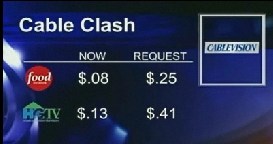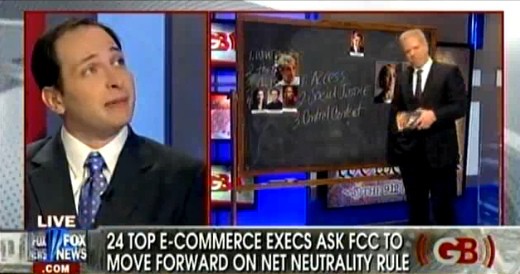
AT&T: 'Google is violating the Net Neutrality tenets we spend millions to make sure don't become law.'
AT&T sent a letter late last week to the Federal Communications Commission calling out Google Voice, the free adjunct Voice Over IP service being tested by Google, for blocking calls to certain high cost telephone numbers. Robert W. Quinn, Jr., Senior Vice President of AT&T’s Federal Regulatory office complained that AT&T has been forced to complete those calls while Google Voice does not, suggesting that might be the equivalent of a Net Neutrality violation, if not an outright violation of call completion requirements established by the Commission.
These days, almost anything can be defined as a Net Neutrality violation. If I was a vegetarian and I blocked meat products from my home, I’d probably get a letter from AT&T’s counsel too.
At issue here is the exploitation of a loophole that was established by telecom regulators to provide extra financial support to rural community telephone companies. When a person places a long distance call, part of the charge is paid to the company that connects the call from the long distance network to the recipient’s telephone line. The fees long distance companies pay vary depending on the size of the community and the length of the call. Small rural areas enjoy a higher call completion fee than urban areas do.
Some enterprising individuals discovered the fees being paid to rural phone companies were higher than the actual costs to provide the service. Traditionally, that extra money was used by rural phone companies, often independent or customer-owned cooperatives, to keep their service costs down and to maintain their equipment. Long distance carriers didn’t care because the number of calls to these rural communities was comparatively small.
But what would happen if a company set up a telephone number to receive lots of calls that would otherwise never be made to such rural communities? The result could be a financial windfall. That possibility persuaded a few rural phone companies to let third parties offer international calling, conference calling and adult phone chat services for no charge beyond whatever the customer has to pay to make the long distance call. In return, the phone company kicks back a significant portion of the extra income they earn from “call completion fees” to the service providers.
AT&T, among others, got wind of this arrangement and flipped out, complaining they were paying an ever increasing bill from rural phone companies hosting these services. Anyone with an unlimited long distance plan could call these numbers for free and stay connected for hours at a time.
Unsurprisingly, AT&T blocked calls to these services for a period in 2007, refused to pay for some prior charges, and sued several phone companies.
AT&T/Cingular spokesperson Mark Siegel told Ars that the reason the company has decided to start blocking these services is because high volumes of calls to similar services are costly, and the cost of those calls aren’t passed on to the customer. “We have to pay terminating access for every minute the person is on the line,” Siegel explained. “Typically these companies run them through local exchange companies that charge high access rates, so we end up paying high access charges.”
The FCC intervened and said phone companies cannot arbitrarily block customer access to phone numbers, and the blocks were removed. Today, the free international long distance calling services are basically gone, but free conference calling lines and adult sex chat services remain, and Google Voice has now discovered the perils of connecting calls, for free, to these services. So now they have blocked access as well. Google Voice beta testers report calling blocked numbers results in perpetual busy signals.
AT&T pounced in a letter to the FCC:
Numerous press reports indicate that Google is systematically blocking telephone calls from consumers that use Google Voice to call telephone numbers in certain rural communities. By blocking these calls, Google is able to reduce its access expenses. Other providers, including those with which Google Voice competes, are banned from call blocking because in June 2007, the Wireline Competition Bureau emphatically declared that all carriers are prohibited from pursuing “self help actions such as call blocking.” The Bureau expressed concern that call blocking “may degrade the reliability of the nation’s telecommunications network.” Google Voice thus has claimed for itself a significant advantage over providers offering competing services.
But even if Google Voice is instead an “Internet application,” Google would still be subject to the Commission’s Internet Policy Statement, whose fourth principle states that “consumers are entitled to competition among network providers, application and service providers, and content providers.” This fourth principle cannot fairly be read to embrace competition in which one provider unilaterally appropriates to itself regulatory advantages over its competitors. By openly flaunting the call blocking prohibition that applies to its competitors, Google is acting in a manner inconsistent with the fourth principle.
Ironically, Google is also flouting the so-called “fifth principle of non-discrimination” for which Google has so fervently advocated (Net Neutrality). According to Google, non-discrimination ensures that a provider “cannot block fair access” to another provider. But that is exactly what Google is doing when it blocks calls that Google Voice customers make to telephone numbers associated with certain local exchange carriers. The Financial Times aptly recognized this fundamental flaw in Google’s position: “network neutrality is similar to common carriage because it enforces non-discrimination . . . Google is arguing for others to be bound by network neutrality and, on the other hand arguing against itself being bound by common carriage,” which leaves Google with an “intellectual contradiction” in its argument.
Richard Whitt, Washington Telecom and Media Counsel for Google, fired back a response on the Google Policy Blog countering AT&T’s arguments:
Google Voice’s goal is to provide consumers with free or low-cost access to as many advanced communications features as possible. In order to do this, Google Voice does restrict certain outbound calls from our Web platform to these high-priced destinations. But despite AT&T’s efforts to blur the distinctions between Google Voice and traditional phone service, there are many significant differences:
- Unlike traditional carriers, Google Voice is a free, Web-based software application, and so not subject to common carrier laws.
- Google Voice is not intended to be a replacement for traditional phone service — in fact, you need an existing land or wireless line in order to use it. Importantly, users are still able to make outbound calls on any other phone device.
- Google Voice is currently invitation-only, serving a limited number of users.
AT&T is trying to make this about Google’s support for an open Internet, but the comparison just doesn’t fly. The FCC’s open Internet principles apply only to the behavior of broadband carriers — not the creators of Web-based software applications. Even though the FCC does not have jurisdiction over how software applications function, AT&T apparently wants to use the regulatory process to undermine Web-based competition and innovation.
The HissyFit is on, and it’s almost entirely beside the point. Once again, Net Neutrality is being used as a convenient flogging tool, this time by a company that spends millions to oppose it, yet sanctimoniously demands others should comply with its founding principles. While the systematic blocking of telephone numbers may echo the kinds of concerns Net Neutrality protection is designed to address, it’s not as on point as AT&T would have you believe.
Google Voice isn’t even close to being a replacement for telephone service. It’s not even openly available to the public. AT&T would have had a stronger argument complaining about MagicJack, the dongle that lets you make unlimited long distance calls for $20 a year. They go beyond just blocking some of the conference calling services — they actually redirect calls to a recording encouraging customers to instead use one of their own partners instead.
Dan Borislow, inventor of MagicJack says “it is not illegal for us to block calls to [conference calling numbers.] We have invited other conference calling companies to interconnect to us for free, so we can complete our customers’ calls to them.”
Google’s public policy response isn’t as satisfying as it could have been either, and uses some weak arguments in rebuttal. Much more important and on point is finding a way to address call completion fee loopholes through a change in telecommunications policy. The telecommunications landscape has fundamentally changed in ways that existing rules could not have anticipated. Addressing that issue would provide immediate relief to both AT&T and Google Voice without dragging consumer interests into a telecom policy cat fight.
Unfortunately, that’s a point far too fine for many media types, bloggers, and the sock puppets to understand (or desire to), and the campaign of Waving Shiny Keys of Distraction will carry on, and may have been AT&T’s intention in making such an argument in the first place.
 Negotiations between Scripps and Cablevision continue to drag on in the northeast as New York, Connecticut, and New Jersey Cablevision cable subscribers go without their HGTV and Food Network.
Negotiations between Scripps and Cablevision continue to drag on in the northeast as New York, Connecticut, and New Jersey Cablevision cable subscribers go without their HGTV and Food Network.

 Subscribe
Subscribe




